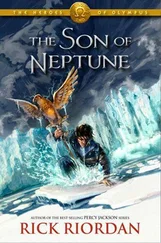(See Demeter, Hades, Tantalus, Theseus)
Perseus
Son of Danae, the daughter of King Acrisius of Argos, and Zeus, king of the gods, who seduced Danae by appearing to her in a blaze of gold. Perseus grew up with his mother on the island of Seriphus, whose king Polydectes fell in love with Danae. Danae disliked Polydectes, however, so Perseus agreed to go on a quest to kill Medusa, a hideous snake-haired creature whose stare turned men to stone, if Polydectes would leave his mother alone. With the help of the goddess Athena, who gave him a polished shield, and the god Hermes, who provided winged sandals and a magic cap that made Perseus invisible, Perseus surprised Medusa while she slept. He cut off her head, using the shield as a mirror to avoid her petrifying glare, and escaped on the winged horse Pegasus, which had sprung from Medusa’s severed neck. Flying back with the Medusa’s head, after capturing the eye of the Gray Sisters and forcing them to reveal the next stage in his quest, he saw the lovely princess Andromeda chained to a rock and guarded by a sea monster. Perseus turned the sea monster to stone by displaying the Medusa’s head, freed Andromeda, and later married her. Back in Seriphus, he used the Medusa’s head to turn Polydectes to stone, and then handed the head over to Athena. The goddess made it part of her aegis, worn around her neck, and Perseus ended his life as king of Tiryns in the Peloponnese, a major kingdom in Greek myth.
(See Andromeda, Athena, Gray Sisters, Helm of Darkness, Medusa)
Polyphemus
Cyclops featured in The Odyssey . Polyphemus loved Galatea, a sea nymph, who preferred Acis, the son of Pan and a river nymph. Polyphemus crushed Acis with a rock but it didn’t help him win Galatea’s affections. Nor did he fare better in his encounter with Odysseus and his men. The cunning Greek hero managed to blind him while he slept in his cave and then escaped by clinging to the underside of the Cyclops’ sheep. Once back on his ship, Odysseus taunted the blind giant—rashly, for Polyphemus threw huge boulders at him and called on his father the sea god to take revenge. Poseidon duly made the rest of Odysseus’ voyage even harder.
(See Cyclopes)
Poseidon
God of earthquakes, horses, and the sea. Zeus’ elder brother and second in majesty only to him. Poseidon was a formidable, half-savage deity. He became lord of the sea, while Zeus ruled the skies and their other brother, Hades, ruled the Underworld. Wielding a divine trident, Poseidon rode the waves in a chariot drawn by sea horses. He married Amphitrite, one of the Nereids, but had affairs with many other beings, human, divine, and bestial. Among his stranger children were the Cyclopes, one-eyed, man-eating giants. Although Poseidon supported the Greeks in the Trojan War, he was an enemy of Odysseus and made his wanderings yet more difficult by sending storms. Sailors and fishermen prayed to Poseidon for fair weather, and a famous temple on the promontory of Sunium was dedicated to him. Poseidon failed to win the affection of the Athenians, however. In a competition with Athena, he offered the city a freshwater spring, while she offered an olive tree. The Athenians chose the latter; olive trees were a vital part of Athenian agriculture.
(See Andromeda, Antaeus, Arachne, Athena, Briares, Cyclopes, Delphin, Hades, Hippocampi, Kronos, Minos, Minotaur, Nereids, Pasiphae, Polyphemus, Theseus, Titans, Zeus)
Procrustes
Gigantic brigand who lived on the Isthmus of Corinth and preyed on travelers. Procrustes forced his victims to lie on special beds he had made, and if his victims proved too short for these “beds of Procrustes,” he would stretch them until they fit; if they were too long, he hacked off their limbs. His evil-doings were ended by the young prince Theseus, who overcame him and forced Procrustes onto one of his own beds.
(See Theseus)
Prometheus
Titan. Prometheus differed from his often mindless brothers in his cunning “forethought” (as his name implies). Neutral in the war between the Titans and Zeus, Prometheus was admitted to Olympus—but secretly he hated Zeus. He took his revenge on the gods with a cunning trick. The Greeks sacrificed animals to the gods, butchering and cooking them on fires outside temples, but some parts were left for the worshippers to eat. Prometheus, by hiding the best meat of a sacrificial ox he had cut up under its guts—which struck both gods and men as repellent—and putting the bones under a layer of appealing fat and skin, persuaded Zeus to agree to choose the latter. From then on in sacrifices the gods received only the fat and bones—which were burnt—and humanity got the best meat. Enraged, Zeus withdrew the gift of fire from mankind. But Prometheus, lighting a torch from the sun’s fiery chariot, gave fire back. For this “theft,” Zeus chained Prometheus to a rock in the Caucasus Mountains, where a vulture devoured his liver. Every night Prometheus’ liver magically grew back, only to be eaten again the next day. He was finally freed from 30,000 years’ torment by Hercules.
(See Epimetheus, Titans)
Python
Ancient female earth serpent (or dragon) killed by the young Apollo when he made Delphi his main shrine. The Python’s name and aura lived on, however, in the Pythoness, the priestess who gave cryptic answers to the questions that people brought to Delphi, the greatest of Greek oracles. Traditionally the Pythoness sat in the innermost sanctuary on a tripod above an immeasurably deep chasm. The fumes rising from the chasm threw her into a trance, in which the god spoke through her in verses so ambiguous they could never be proved wrong, no matter how events turned out.
(See Delphi)
Q
Quintus
Quintus was a common Greek name. One notable Quintus, Quintus Smyrnaeus, was a Greek epic poet who continued Homer’s stories, although his poetry was said to be of inferior quality to Homer’s. He’s best known for his work Posthomerica , which covers the time period between the end of The Iliad and the end of the Trojan War.
R
River Lethe
One of the rivers of Hades, the Underworld. The River Lethe flowed around the Elysian Fields, the brightest parts of the Underworld, and then around Tartarus, the Underworld’s most gruesome quarter. Any spirits who drank from its “lethal” waters forgot everything about their former life on Earth.
River Styx
Another of the rivers of Hades, the Underworld. The black waters of the River Styx surrounded the Underworld with nine loops, one of which was the River Acheron. To cross it the shades of those who had recently died had to pay the infernal boatman Charon an obol, a small coin traditionally buried with the dead.
(See Achilles, Charon, Hades, Hermes)
S
Satyrs
Exuberant, mischievous, exclusively male creatures who had a goat’s horns, pointed ears, tail, and cloven hooves but were otherwise human. They were among the followers of Dionysus, the wine god, and were often drunk and always chasing women—both mortals and nymphs. Pan had many of the characteristics of a satyr. Often seen carousing with satyrs was Silenus, a fat but jolly old man who was so drunk he kept falling off his donkey.
(See Dionysus, Nymphs)
Selene
Goddess of the moon and daughter of Helios, the sun god. Selene rode a lunar chariot that was drawn through the sky by silver horses. She fell in love with the incredibly handsome youth Endymion, a mortal son of Zeus. When Selene begged Zeus to keep Endymion immortally young, Zeus granted her wish, but caused Endymion to sleep nonstop. Despite this slumber, Endymion remained Selene’s sole lover.
Читать дальше











